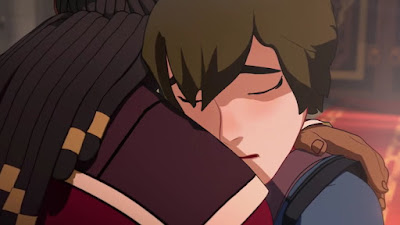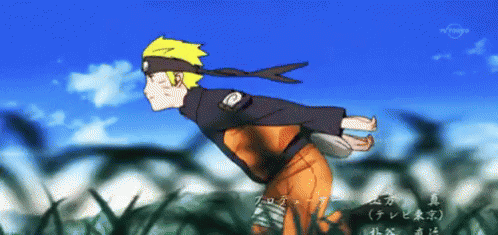Read the next entry here.
The title character begins to be revealed...
1.2, "What Is Done"
Written by Aaron Ehasz and Justin RichmondDirected by Giancarlo Volpe, Villads Spangsberg, and Lih Liau
Synopsis
 |
| It seems a long way to go, even with production. Image taken from the episode, used for commentary. |
The Moonshadow Elf raiding party contemplates approach to the castle of Katolis. The party leader, Runaan, speaks against Rayla, although others recognize that her assistance is needed, even as they scorn her for her betrayal of them. Runaan takes Rayla aside and rebukes her weakness and softness of heart. She accepts the rebuke and pleads for the chance to redeem herself; Runaan refuses her, and she plots to proceed on her own.
In the castle, Callum tries to apologize to Ezran and cajole him out of his chambers. Unsuccessful, he proceeds to the castle library to pull books for the journey; he encounters Claudia there, and she teases him. She also explicates some of the magic at work in the world. A comment from him sends her off running.
 |
| The face of a man resigned. Image taken from the episode, used for commentary. |
 |
| It's not the worst goodbye. Image taken from the episode, used for commentary. |
After, as Harrow is armed, Viren offers a possible means to protect his king. Harrow refuses the offer. Vehemently. Despite Viren's Machiavellian arguments.
 |
| No, this isn't a good look. Image taken from the episode, used for commentary. |
Rayla proceeds toward the castle, encountering and evading patrols. She begins a long climb to the castle, advancing with some difficulty and more determination. At length, she crests the castle walls and proceeds to attempt the assassination. She encounters Callum along the way, following him. He confronts her, and a chase ensues; melee with the castle guards soon follows, briefly. She notes that Harrow and Ezran are the targets; Callum claims to be Ezran to divert her from his half-brother; the child himself intervenes, and the chase begins anew. It leads through hidden tunnels to a secret chamber wherein lies the egg of the late dragon king.
 |
| This would seem to change things, yes. Image taken from the episode, used for commentary. |
Discussion
Some anachronism makes itself evident in the episode. For example, in the Katolis library, Claudia comments about having eaten peanut butter for lunch. The US National Peanut Board notes that, while peanuts have been cultivated for thousands of years, peanut butter as it is commonly known dates to the late nineteenth or early twentieth century, relying on mechanical production methods representing hundreds of years of advances since the time-frame paralleled in The Dragon Prince. Admittedly, the reference serves to familiarize things to the presumed primary audience of older children and young adolescents, and similar anachronisms are present even in Tolkien (the Shire is supposed to be an analogue of rural England, where potatoes weren't present until New World colonialism had taken root), so there's reason and precedent for the disparity. That does not mean it is not present, though.
 |
| Exhibit A. Image taken from the episode, used for commentary. |
 |
| Exhibit B. Image taken from Know Your Meme, used for commentary |
Nor does it mean that some unfortunate Orientalism is not present. Although the series is already working towards diversity of cast, both in voice-actors and in on-screen presentation, it echoes some unfortunate exoticization of eastern lands and peoples. The Elves dwell in the east, and Rayla's approach to the castle of Katolis rings of no few tropes from anime depictions of ninja--the "Naruto Run" and tree-hopping, in particular. Others can speak, perhaps, to issues of essentialization and how fraught they may or may not be, given concerns of anime production, but the episode borrowing those tropes seems more an issue of cultural appropriation than appreciation, more reductive than homage, and that is not to the show's credit.
One thing that the show does seem to get right, though, is Harrow's fatalism. There is mention of the Five Kingdoms in the episode, later explicitly called the Pentarchy, evoking the early English Heptarchy. Harrow's insistence that he pay the price for his earlier misdeeds and that matters will unfold despite any efforts he can make ring of "Fate ever goes as it must" from Beowulf and the acceptance in Deor and other early English verse that bad things will happen, that violence between people is inevitable, and that there is always a cost incurred.
And in both bodies of work, there is a way to break such cycles.

No comments:
Post a Comment